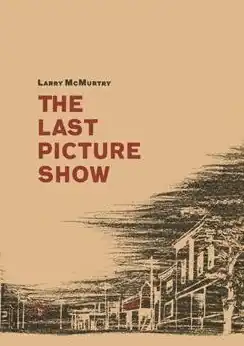The Last Picture Show (novel)
 | |
| Author | Larry McMurtry |
|---|---|
| Language | English |
| Series | Thalia: A Texas Trilogy/Duane Moore series |
| Genre | Coming-of-age story |
| Published | November 1966[1] |
| Publisher | The Dial Press |
| Publication place | United States |
| Media type | |
| Pages | 215 (first edition) |
| ISBN | 0891908897 |
| OCLC | 291926 |
| Preceded by | Leaving Cheyenne |
| Followed by | Texasville |
The Last Picture Show is a coming-of-age novel by Larry McMurtry published in 1966. Set in the small fictional town of Thalia, Texas in the early 1950s, the novel explores the lives of a group of teenagers as they navigate the complexities of adolescence, love, and the decline of their hometown. The novel received positive reviews. It was adapted into a film of the same name, with a screenplay written by McMurtry and director Peter Bogdanovich.
Plot
Sonny and Duane have finished playing their last game for the football team at Thalia High School. They spend lots of their time in the town’s pool hall and movie theater, both owned by Sam the Lion. A mentally disabled boy under Sam’s charge, Billy, sweeps the businesses; Billy sometimes becomes lost after wandering outside with his broom.
The two boys share accommodations in a rooming house and a pickup. They often go on double dates, Sonny with Charlene and Duane with Jacy Farrow. Sonny breaks up with Charlene, finding that he feels indifferent about her. Duane’s relationship with Jacy is the envy of other boys, including Sonny. Jacy uses her looks to court attention and adventure, and she is the daughter of a wealthy oilman and an eccentric mother who is prone to drinking.
In the spring semester, the boys play basketball under the direction of the lazy and disparaging Coach Popper. Popper is also the teacher for a class on civics, and in his class, like others in the school, students need put forth little effort. Popper excuses Sonny from school to take his wife, Ruth, to the doctor. Ruth feels unseen by her husband, including while dealing with breast cancer. The trip to the doctor is the beginning of an affair between Ruth and Sonny. Sonny visits her while the coach is at practice or fishing. Duane encounters problems in his relationship with Jacy as she begins to hang out more frequently with a group of city kids, including at parties involving skinny dipping. Jacy continues getting closer with the town kids while stringing Duane along. On a whim, Sonny and Duane decide to go to Matamoros, Mexico, where they watch a pornographic movies and visit whores.
The senior class goes on a graduation trip to San Francisco. Jacy sleeps with Duane on the trip, but she breaks up with him when they return to Thalia. Duane leaves town to find work as a roughneck. After a romance with a city boy does not work out for her, Jacy begins going out with Sonny. Sonny abruptly quits seeing Ruth, which devastates her. Duane comes back to town with a new car. Duane fights Sonny over Jacy, blinding Sony in one eye. Sonny and Jacy elope, but their marriage is short lived. Jacy anticipated apprehension by her parents, but she wanted to do the marriage for the fun of it. Sonny rides back to town with Lois; they stop at a hotel where they have sex. Jacy and her folks go off to Dallas, with plans to stay until she starts college.
Sonny, who has now graduated high school, struggles with feeling like an outsider, especially at a football game that Thalia wins. He is living in the pool hall that Sam the Lion left him in his will. He feels listless and like an outsider. Duane and Sonny meet up one last time before Duane goes off to Korean War. The movie theater goes out of business, and Billy gets hit by a truck, leaving Sonny shaken. Sonny goes to see Ruth who can’t decide whether to forgive him then crying she takes his hand to her face.
Reception
The Last Picture Show received critical acclaim upon its publication.[2] Writing for The New York Times, Thomas Lask praised the rendition of small town life, writing that McMurtry "knows his town and its folkways".[3] Lask, however, wrote that "some of the writing could be smoother", including the transitions between scenes.
Adaptations
The novel was adapted into a 1971 film of the same name directed by Peter Bogdanovich.[4]
References
- ^ Jack, W. T. (November 13, 1966). "Sex Wasn't Everything". The New York Times. Retrieved December 29, 2024.
- ^ "How The Last Picture Show Changed the World's View of Small Town Texas". texashighways.com.
- ^ Lask, Thomas (December 3, 1966). "Books of The Times". archive.nytimes.com. Retrieved August 20, 2025.
- ^ Vognar, Chris (May 29, 2024). "The Texas Canon: How Larry McMurtry conjures small-town loneliness". Houston Chronicle.